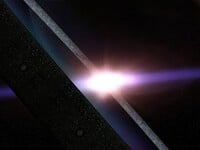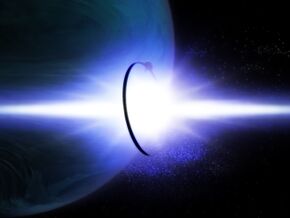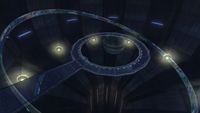Halo Array
From Halopedia, the Halo wiki
- "Weapons of last resort, built by the Forerunners to eliminate potential Flood hosts, thereby rendering the parasite harmless."
- — 343 Guilty Spark
The Halo Array, Halos[1] (as they are referred to as by the Covenant[2]), alternatively known as the Sacred Rings[3] by the Covenant, Fortress Worlds[4] by their creators, and Installations by the AI Monitors that run them, are seven massive ring-shaped installations constructed by the Forerunner throughout the galaxy over one hundred thousand years ago as a last resort when combating the parasite known as the Flood. When nothing else could be done, they activated the rings which killed all sentient life forms within three radii of the galactic center. In addition to their role as weapons of last resort, the Halo installations are also research facilities. These facilities are chiefly used for studying the Flood.
Background
The Halo Array is a network of seven installations.[5][6] Though separated by thousands of light-years, the seven installations are networked together and capable of remote activation at an Alderson Disk known as the Ark outside the galaxy. The array was designed by the Forerunners to eradicate sentient life from the galaxy, thereby denying the Flood a source of nourishment with which to expand, eventually starving the parasite to death. Each Halo installation has a maximum effective range of 25,000 light-years.[7] The exact means the array uses to conduct this "mass sterilization protocol"[8] are unknown, though it is assumed to utilize energy in some type of form. It is also possible, that once the Index is reconnected with the Core, a dormant battery somewhere on the ring will activate and harness some sort of energy in the center of the ring. Once the energy reaches a mass suited for the range, the 3 phase pulse generators simultaneously release a pulse, possibly releasing the energy which will then lock onto and destroy all sentient life.
The Halo Array has been fired once in known history, approximately 100,000 years ago, by the Didact[9] in order to stop the Flood from overwhelming the galaxy. Despite being the network's builders, the Forerunners were killed in this last suicidal attempt to save the rest of the universe from a worse fate.[10] The array has nearly been activated three times since, Alpha Halo was almost activated by the Master Chief before being deactivated by Cortana, while Delta Halo was activated by Commander Miranda Keyes, forced by the Jiralhanae Chieftain Tartarus, and Sergeant Johnson was forced by the Prophet of Truth to activate the Ark. None of which were successful. A replacement Halo for the destroyed Alpha Halo was activated outside of the array's range, eliminating the freed Flood, but did not activate the rest of the array.[11]
Each Halo Installation is given a designation number, from 01 to 07, and is overseen by a Monitor. The Monitors are given control of the Installations' Sentinels, Constructors and Enforcers, and are responsible for containing the Flood test subjects in their research facilities and protecting the Halo from intruders.
The Array also encompasses an actual Alderson Disk, referred to as The Ark or Installation 00, from which the array can be remotely and safely activated while out of firing range, and able to survive the effects.[12] The Forerunners also built active Shield Worlds, Micro Dyson Spheres encased in a slipspace field with their own star in the center and a habitable environment, as a means to escape the effect without having to leave the galaxy.[13]
History

The Halos were constructed by the Forerunners a few hundred years after the Flood was discovered by the Array's makers, because their builders saw that their current isolation and containment procedures were not adequate to stop the spread of the Flood. Little is known of their extensive history, (At least one was functional for 101,217 local years)[14], but after exhausting every other tactical option, their creators had no choice but to activate the Halos' main weapon, and terminate all sentient life in the galaxy.[15]
The seven Halos then remained relatively dormant for one hundred thousand years (Though at least one of them experienced a major Flood outbreak; and reference given to brief visits by other species by 343 Guilty Spark in "Conversations from the Universe" ) until one of them, Installation 04 (known amongst fans as Alpha Halo), was discovered by the theocratic alien superpower, the Covenant. The Covenant, who revered the Forerunner as gods, believed that the Halo's main weapon was actually a source of "Divine Wind" meant to propel them on a path they called the "Great Journey". During their investigations on Installation 04, the Covenant encountered the Flood, however they quickly, but only partially contained the outbreak. After the arrival of the Human vessel UNSC Pillar of Autumn, Captain Jacob Keyes accidentally breaks the containment, thinking to find a large Covenant weapons cache. A massive four way melee ensued between the Covenant, Sentinels led by 343 Guilty Spark, the Flood, and the Humans. This finally culminated when the Human Super-soldier known as Spartan 117 (Master Chief) detonated the fusion engines of the Pillar of Autumn on the surface of the Installation, compromised the structural integrity of the ring, and, due to the gravitational momentum and inertia still perpetuating the ring in orbit around Threshold, tore the ring apart into pieces. The remains of installation 04 are scattered as debris in space, both large and small. The explosion sent massive chunks of the ring careening into the moon Basis, as seen in the Halo 2 Multi-Player Level "Burial Mounds," due to the constant bombardment of small objects from the ring as seen in the sky on that map. Other large sections of the ring are seen in the opening scene of Halo 2, drifting in space around Threshold. It is also highly likely that large portions of Alpha Halo debris were drawn into Threshold, never to be seen again. [16]
Later, a second Halo, Installation 05 (known amongst fans as Delta Halo), was discovered. On this Halo, the Flood had already been released somehow. And owing to this, a similar conflict erupted. This conflict ended in the Flood manifesting a Gravemind and successfully escaping the ring aboard infected Covenant ships. The ring was nearly activated by Tartarus, a Brute Chieftain, but Commander Miranda Keyes pulled the Index out of the Installation at the last moment, causing the six remaining Installations to go on "standby mode", ready for remote activation from the Ark.
The Humans return to Earth and resume their fight against the Covenant, who have uncovered a large structure on Earth, which they assume to be the Ark. The Covenant set the Forerunner Dreadnought down in the center of the structure, activating it. To everyone's surprise, the structure is not the Ark, but a portal to the Ark, a massive artificial world located outside the galaxy. Human and Elite forces go to the Ark to try and stop the Covenant from activating the Ark, thus activating the remaining Halo rings. It is then that the Flood Gravemind appears, having turned the Covenant planetoid city High Charity into a Flood hive. The Hive crashes on the Ark, releasing the Flood.
It is revealed at this point that the Ark was constructing a new Installation 04, to replace the one destroyed, which is only days from being complete. The Humans eventually decide to activate the new ring to stop the Flood, which in turn destroys itself and damages the Ark. It is unclear how the system was affected by this, but the Halo system appears to have been irreparably damaged by the destruction of Installation 04, its Monitor (343 Guilty Spark), and the heavy damage done to the Ark.
Features
Custodial
The Installations are designed to be run by advanced Artificial Intelligence constructs specially purposed by the Forerunners. The highest Intelligence on each Installation is a single Monitor.[17] The Monitor's task is to ensure that the Installation's Constructors, Sentinels and Enforcers repair, maintain and defend the ring from damage, contain the Flood specimens, and ensure that their own Installation is ready to fire on demand, including running activation simulations.[18]
In addition, each Installation contains less intelligent constructs, known as Sentinels. The Sentinels serve virtually any purpose necessary to ensure that the Halo functions properly; they are also capable of combating small Flood outbreaks. Should a major Flood outbreak occur, heavier automation's, such as the Enforcers and Sentinel Majors will be created to assist the Sentinels. In the meantime, Constructors are also created to ensure that the Forerunner structures on the Installation are kept in optimal shape, and that they are not damaged by conflict or weather.[19]
Save for the Monitor, all automation's can be constructed at specialized Sentinel Production Facilities that float high in the Halo's atmosphere. These Facilities have never been seen (except briefly in the sky above the level Sacred Icon, one can be seen crashing as you exit near the end of the level, you then fight through the remains of it in Quarantine Zone), but they seem to contain limitless materials for constructing any number of automation's.
Environment
The Halo installations were also designed to be habitable, and support a wide range of environments, habitats, ecosystems and climates. The two known installations, Alpha and Delta Halo, both supported warm, temperate forests[20][21] that were both deciduous and coniferous, swamps, and cold, snow covered tundra environments[22][23]. The Ark had climate ranging all the way from tundra[24], to forest[25],to desert[26]. It is unknown whether this range is shared by all Halo installations, but the similarity of these environments and that of Installation 00 makes it likely. However, if one observes the holograms of the installations after stopping the Ark, one will see that the rings have different surface features and may have different atmospheres as well.
While the terrain may appear to be naturally formed at first glance, it is actually artificially transformed by the Constructor and Sentinel constructs. An intricate layer of metallic panels is laid down several meters below the surface of the terrain, upon which rock, soil, and eventually vegetation is added. Slopes, hills and mountains can be created by sculpting these panels[27]. Some features, such as landslides, are the result of time, and have been formed naturally. Others, such as the myriad network of tunnels and cave systems that riddle the Installations internal structure, are travel conduits used by the rings Sentinels and Enforcers. There are also some life-forms that live naturally on the Halos. Whether these were created by the Forerunners or were brought to the Halos by them is unknown.
Technology
Each Halo has several assets that are conditional to all Installations. Each contains a Control Room located somewhere upon its inner surface, from which a Reclaimer must manually insert the Installation's Index to activate it. Each also possesses a Library, a large structure protected by an energy shield, where the Index is housed and protected by Sentinels[28][29]. The index itself is a semi-solid holographic representation of the data needed to activate the ring, and can only be inserted successfully by a Reclaimer.
Installations also possess Cartographer facilities, holographic representations of the Installations inner passages and networks, to be used as a navigational reference for exploring the Installation. Flood Containment Facilities are also standard, used by the Installations Monitor to conduct research on and observe the surviving Flood specimens, also protected by Sentinels to prevent outbreak.[30]
Installations also contain advanced teleportation grids, allowing instantaneous transportation for a Monitor or Reclaimer to any place on the Installation. These grids can not be controlled by the Flood but the Gravemind is able to use it by controlling 2401 Penitent Tangent[31]. For regular Sentinels, the Installation is riddled with tunnel and cave networks for access and transportation[32].
Function
The Halo Array is complex, but each can be activated individually by a Reclaimer, also activating the other Installations, or they can all be activated simultaneously from The Ark. In the event of a major Flood outbreak, the Installation's Monitor will seek out a Reclaimer if available, who they will enlist to aid them. It will teleport them to the Installation's Library, and assist the individual in retrieving the Index, needed to activate the Installation. The Monitor then stores the Index within its data arrays for safe transportation, lest the Reclaimer fall prey to the Flood before they can activate the Installation. Once at the Control Room, the Reclaimer must insert the Index into the control panel in order to begin the activation sequence.
The main weapon is amplified by phased pulse generators, 3 of which are known to be close to the Control Room. It is unknown exactly what means the Halo Array employs to kill sentient lifeforms over non-sentient life. A common misconception is that it kills the Flood; however this is untrue as it kills all sentient beings as resource-denial to the Flood. Each Installation has a maximum effective radius of 25,000 light-years[33], and is apparently of the "Highest possible threat assessment from biological contamination and radiological annihilation"[34]. The pulse is designed to kill all sentient life in the Installations three-dimensional radius, with the entire array covering the entire galaxy. The only known way to avoid the effects of these pulses is to escape to a Shield World, located in slip-space and therefore immune from its effects, or to escape to Installation 00, which is out of range. Once activated the other installations will fire simultaneously, eradicating all sentient life in the galaxy.
Astronomy
The "Ringworld" of Halo is much smaller than Larry Niven's Ringworld. While the diameter of Niven's ring world is close to the diameter of Earth's orbital of 300,000,000 km, the 10,000 km diameter of Halo is much closer to the diameter of Earth itself, which is 12,756 km. Ringworld has a star similar to our sun in its center, and Halo is orbiting a planet, but does not encircle it. Alpha Halo is positioned in the 1st Lagrangian point between Threshold and its moon Basis.
Besides the very beautifully sculpted landscape on Halos surface, the sky is also worthy of attention. Depending on the viewpoint, you can see a star, a moon (called Basis), a gas giant (called Threshold), and the band of Halo itself, which looks like a street into the sky.
In the course of Halo: Combat Evolved, neither Threshold nor Basis is reachable, all action takes place on, in, or near the Halo installation. In Halo 2 there is a multiplayer level on Basis and a campaign level on a gas mining facility in Threshold's atmosphere.
While the locations of the other Halo rings are unknown, it has been speculated that Alpha Halo was located in the Iota Horologii System.
Trivia
- The Halo textures for both Halo: Combat Evolved and Halo 2 are the same, and are both symmetrical. Also, when you look straight up, a shape in the clouds of the Halo resembles a "Grey" alien. It could have been put in there on purpose, although it might be a coincidence.
- Halo: Ghosts of Onyx describes the Halos as being the "Sword" of the Forerunner, and the Shield Worlds was their "Shield." This description is mysteriously similar to the lines Cortana says on the Halo 3 Announcement Trailer; "I am your shield, I am your sword."
- In the clouds of Halo, on every level, you can see the face of Chris Carney. This can also be seen in Halo 2.
- Considering its 10,000 km diameter, Halo would need to rotate at 7 km/s in order to produce Earth-like "gravity". However, in the novel "The Fall of Reach", Cortana says that "some numbers don't check out" and discovers an artificial gravity field on the ring. This is another possible 7 reference.
- In a Halo: Combat Evolved Prototype, Installation 04 had a disconnected section where there is a railroad bridge that floats in space.
- The names of the installations are Beta, Epsilon, Eta/Kappa, Alpha, Delta, Gamma and Zeta, ordered from 01 to 07. Eta is suggested by Halo 3 hex files[35], while Kappa is from the Smuggler transmissions.
- On the screen where Captain Keyes taps his pipe on the opening scene of the Pillar of Autumn you can see the word HALO by the hologram of Installation 04, even when they didn't know that is what it was called.
- There are 7 Halo Rings, another 7 reference.
- In each game, the first level that takes place on a Halo always has "Halo" in its name. For Halo:CE and Halo 3, the level is just called "Halo" (it is likely called so in both games, because the Halo that is shown is the same number, 04.). In Halo 2, the level is "Delta Halo".
- It is uncertain if the Array is still functional after the damage done to the Ark. It is possible that each individual Ring can be activated, but not all of them simultaneously until the Ark can be rebuilt/repaired.
- It is stated that the Halo array was fired 100,000 local years ago which may mean it may have been activated in more or less years in Earth time.
- In the opening cutscene for Delta Halo (Level), around 1:40 Africa can clearly be seen as a part of the geography on the surface. Interestingly, the other land masses included on the surface only barely resemble Asia and Europe.
Sources
- ^ Halo: Combat Evolved, level Truth and Reconciliation
- ^ Halo: The Flood page 38
- ^ Halo 2, level Gravemind
- ^ Halo: The Flood page 193
- ^ 343 Guilty Spark: "Collectively, the seven Orbitals, artificial rings built by the Forerunners, an extinct technologically advanced race which built Halo to kill the floods food which are Humans and Covenant, to starve the flood to death, mostly to destroy every species in the galaxy. The two known Halo installations, referred to as Alpha Halo and Delta Halo respectively, orbit gas giants, though it is not known whether this is the case of all the Halos, and Alpha Halo maintained an atmospheric mining facility until it was destroyed by the Covenant
- ^ Halo 2, The Oracle (Level).
- ^ 343 Guilty Spark: "Technically, this installation has a maximum effective range of 25,000 light years."
- ^ Why the Flood is, naturally, simply too dangerous to release, and mass sterilization protocols may again need to be enacted.
- ^ Iris Array Recorder Data
- ^ 343 Guilty Spark: "After exhausting every other strategic option, my creators activated the rings. They, and all additional sentient life in three radii of the galactic center, died, as planned."
- ^ Halo 3, Halo (Level)
- ^ 343 Guilty Spark: The Ark is out of range! Of all the active installations!
- ^ Halo: Ghosts of Onyx
- ^ Halo: The Flood page 238
- ^ Halo 2, level The Great Journey
- ^ Halo: Combat Evolved, level The Maw
- ^ Halo: Combat Evolved, level 343 Guilty Spark
- ^ Halo 2, Gravemind (Level), 2401 Penitent Tangent: This installation has a successful utilization record of 2.1 trillion simulated and one actual. It is ready to fire on demand.
- ^ Halo 2, level Sacred Icon
- ^ Halo (Halo: Combat Evolved Level)
- ^ Uprising (Level)
- ^ Assault on the Control Room
- ^ Quarantine Zone (Level)
- ^ The Covenant (Level)
- ^ The Covenant (Level)
- ^ The Ark (Level)
- ^ Halo (Halo 3 Level)
- ^ The Library (Level)
- ^ Sacred Icon (Level)
- ^ Halo: The Flood page 240
- ^ Gravemind (Level)
- ^ Halo: The Flood, page 242.
- ^ Halo: Combat Evolved, Two Betrayals (Level)
- ^ Halo: Ghosts of Onyx
- ^ http://halo.wikia.com/wiki/User:Mutoid_Chief#Rings_in_the_Citadel
Template:Forerunner2 giant space donut


